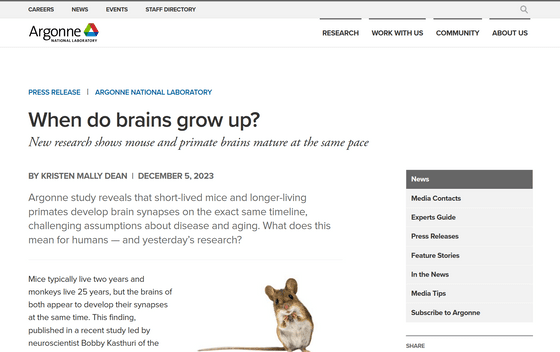The theory that animals with short lifespans develop their brains faster than animals with longer lives is incorrect, and it is shown that they develop at the ``same speed''

Unlike monkeys, which take several years to reach adulthood, mice reach adulthood in just a few months, which makes it seem like they grow faster and have faster brain development, but this idea turns out to be wrong.
When do brains grow up? | Argonne National Laboratory

Mice usually live for 2 years, monkeys live for 25 years, and mice grow faster. Until now, it was thought that mice that reach adulthood faster have faster brain development, but when a research team affiliated with Argonne National Laboratory in the United States examined brain samples, they found that mice and monkeys It turns out that synapses in the brain develop at the same rate.
When researchers looked at neurons and synapses firing in the brains of young mice, they found that the mice performed basic tasks such as walking and eating, despite having few measurable connections. thing.

Neuroscientists have traditionally conducted research by comparing adult mice that are several months old and adult monkeys that are several years old, assuming that since they are the same adult, their brains will probably have the same degree of development. However, this study showed that this hypothesis may be wrong.
Previous research compared 3-month-old mice and 5-year-old primates, but even though both were adults, there were questions about differences in the amount of synapses.
The researchers pointed out, ``There are many studies that compare human diseases such as autism with mice that are several months old, but we think this will cast doubt on these studies.''
Additionally, mice and other mammals learn to walk soon after birth, whereas humans, by contrast, take several years or more. Regarding this difference, the scientist involved in the research said, ``It is thought that the human brain follows a completely different growth process than the brains of other mammals.''

Related Posts:







